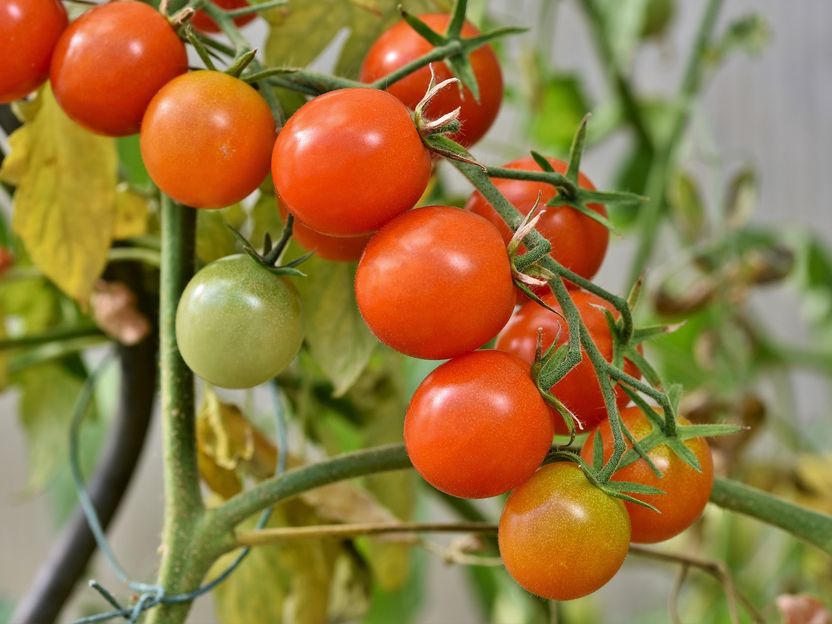vaccines against viral diseases in tomatoes and courgettes
The CSIC participates in the initiative through the Institute of Subtropical and Mediterranean Horticulture La Mayora, a joint centre with the University of Malaga.

CSIC
Emerging viral diseases, such as those caused by begomoviruses and tobamoviruses, are threatening crops of tomatoes and cucurbits (family of vegetables to which watermelon, melon and zucchini belong, among many others) worldwide. The Virtigation project, financed with European funds, tries to develop solutions to face this challenge. The Spanish National Research Council (CSIC) is participating in the initiative through the Institute of Subtropical and Mediterranean Horticulture La Mayora, a joint centre of the CSIC and the University of Malaga. The participating researchers will use a multidisciplinary approach to design plant vaccines, through the induction of natural resistance; biopesticides, such as plant extracts, targeting insect viral vectors and integrated pest management strategies, such as cross-protection and disinfection of contaminated soils and substrates.
Currently, the most dangerous begomoviruses affecting tomatoes and cucurbits are Tomato yellow leaf curl virus (TYLCV) and Tomato New Delhi leaf curl virus (ToLCNDV), both of which are transmitted by whiteflies. These viruses have wreaked havoc in greenhouses and fields in Spain and Italy. In recent years, another pathogen has emerged as a serious threat to tomatoes: the tobamovirus known as Tomato brown rough fruit virus (ToBRFV), which is transmitted mechanically through, for example, plant wounds. This tobamovirus has not only affected southern Europe, but also northern Europe: outbreaks have affected hundreds of hectares in Germany, France, Belgium, the Netherlands and the United Kingdom.
Tomato and cucurbit crops have been severely affected in neighbouring countries of the European Union and in some of its trading partners, such as Morocco, Israel and India, making these plant viruses a global challenge. In response to these global virus threats, the four-year Virtigation project in Europe and Israel aims to reduce losses in tomato and cucurbit crops by at least 80%.
These viruses are highly stable, virulent and aggressive. Infected tomato and cucurbit plants often develop severe symptoms resulting in reduced photosynthesis, growth hormone and nutrient levels in these plants.
"It is likely that warm weather conditions and intensive production practices such as excessive use of pesticides are accelerating the spread of these viruses. To date, there are no quick and lasting ecological solutions on the market to deal with the devastation caused by these plant pests. Unless effective and environmentally friendly solutions are found to protect tomatoes and cucurbits from these viruses, this multi-billion dollar value chain will be at risk," explains Jesús Navas Castillo, researcher at the Institute of Subtropical and Mediterranean Horticulture La Mayora (CSIC-UMA).
The project aims to reduce by half, or even completely eliminate in some circumstances, the use of chemical pesticides to control plant viruses and their insect vectors. To achieve this, the participating researchers will employ a multidisciplinary approach to design plant vaccines, through the induction of natural resistance; biopesticides, such as plant extracts, targeting insect vectors and integrated pest management strategies, such as cross-protection and disinfection of contaminated soils and substrates.
"In recent years, society has become aware of the importance of developing our capabilities to deal with pandemics. Viral diseases not only have a direct impact on human health, but can also undermine the sustainability of our food production systems when they cause significant crop losses. There is therefore a pressing need to increase our knowledge and capacity to apply novel and sustainable solutions,' says project leader, researcher Hervé Vanderschuren from KU Leuven University (Belgium).
Virtigation brings together 25 partners from academia, industry, research and technology organisations, agricultural extension services and SMEs from 12 countries: Belgium, Spain, Luxembourg, the UK, Italy, the Netherlands, France, Germany, Austria, Israel, Morocco and India.
Note: This article has been translated using a computer system without human intervention. LUMITOS offers these automatic translations to present a wider range of current news. Since this article has been translated with automatic translation, it is possible that it contains errors in vocabulary, syntax or grammar. The original article in Spanish can be found here.





























































